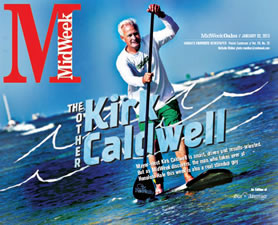The Other Kirk Caldwell
Mayor-elect Kirk Caldwell is smart, driven and results-oriented. But as MidWeek discovers, the man who takes over at Honolulu Hale this week is also a real standup guy
What does a man do after the most-grueling mayoral campaign in Honolulu’s history? If he’s Kirk Caldwell, he gets on a surf or paddle board. Or he goes to Maui to hunt and ride a bike, or to South Point on the Big Island to fish.
“There’s this huge bay at Milolii. We camped there,” says Caldwell. “We went net fishing twice. Jumped off the cliffs into the bay. Ate opihi off the rocks. Stayed up late singing karaoke and listening to Night Marcher stories.
“(Hawaii Island Mayor) Billy Kenoi came out to join us. He’s the one who challenged me to jump off the cliffs and eat the opihi off the rocks. I had to remind him that I was Waipahu-born, but raised on the Big Island. It was good to get away. Milolii is like old Hawaii. My heartbeat slows there.”
Caldwell’s heartbeat quickened on his return to Honolulu, where he’s being sworn in this week as the 14th mayor in Honolulu’s history. His administration will require 23 directors, 23 deputy directors and a slew of mayoral aides. He’s been considering two or three possibilities for each position.
“It’s been gangbusters,” says Caldwell. “We’ve been interviewing until 11 at night.”
Caldwell rejects the suggestion that he will hold over people from the administrations of Peter Carlisle and Mufi Hannemann.
“I want to build my own team fresh. I want people who will move the needle, people who will always focus on how we can solve the problem, not on blaming problems on previous administrations. I’m a lawyer, and lawyers are problem-solvers. I want to talk about solutions. If you hear me blaming someone else, I want you to call me on it.”
Caldwell rejects the notion that he owes too many too much to allow him to bring anything “fresh” to the table: endorsements from almost all of Hawaii’s powerful unions and $2.8 million in anti-Cayetano ads run by the Pacific Resource Partnership.
“Every politician needs help from all kinds of people,” says Caldwell. “I went to unions, businesses, different people. I went to the carpenters, but they decided to stay with Peter as they had in 2010. They gave him a bunch of money, not me. I don’t believe that I owe them anything.
“And PRP did what they did to support rail. It helped Peter as much as it helped me. Enough already. I know what momentum is, and I had it, just as I did two years ago – honks from cars as they pass you waving, thumbs up from drivers. You can feel it.
“And it wasn’t just a pro-rail vote. Pro-rail sentiment came in at 45-48 percent, but I received 54 percent of the vote. I got the pro-rail vote in the general, but I got votes from people who were anti-rail as well, but who saw the election about water, sewage, garbage, potholes as well. They were saying we don’t want rail, but there are other issues too.”
Sitting behind a polished conference room table in the 14th-floor Alii Place law offices of Ashford and Wriston, Caldwell looks very much the real property lawyer he’s been for the better part of three decades. His appearance begs the question how a man who’s represented some of the wealthiest property owners in the state found his way into the grit of politics and grime of dealing with Honolulu’s garbage, sewage and potholes.
“Fate and luck,” says Caldwell. In 1964 fate found Caldwell lying on the living room floor of his parents’ Big Island home. With his father, a plantation doctor, he watched footage of police beating demonstrators in a Southern city. Caldwell asked, “How can human beings be so cruel to other human beings?”
A half-dozen years later, as an undergraduate student at Tufts University outside Boston, Caldwell added the war in Vietnam to his concerns. The anti-war movement motivated Caldwell to move on to graduate school at The Fletcher School of Law and Diplomacy. As completion of his master’s degree there approached, he was planning a trip to Venezuela. A Fletcher dean from Hawaii told him about internships available in the office of Sen. Daniel K. Inouye in Washington.
Caldwell took her advice and signed on for a summer in tropical Washington. “I met Donna in D.C.,” says Caldwell with a smile. “Lust makes you do amazing things.”
“Donna” was Donna Tanoue, a graduate of the University of Hawaii who had come to Washington to attend Georgetown University Law Center. Caldwell turned his internship into a full-time job as an Inouye staffer.
“Sen. Inouye was very gracious,” Caldwell remembers. “Jimmy Carter was in the White House, and Democrats controlled both the Senate and the House. We were working on legislation regarding sugar, pineapple, the deep-water cable. Sen. Inouye would take me to the Oval Office with him to see the president sign bills I had worked on. It was a very powerful experience.”







